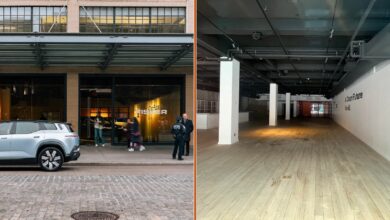Robert desperately wants to buy an electric car but because of where he lives there’s one big problem

By David Southwell For Daily Mail Australia
04:08 26 Apr 2024, updated 04:50 26 Apr 2024
An apartment dweller desperately wants to buy an electric vehicle but faces an apparently insurmountable obstacle common to many in his situation.
Robert Till, who lives in a strata-managed set of Brisbane units, has nowhere to charge an electric vehicle in the building and even after offering to pay to have a charger installed in the underground car park, was knocked back by the body corporate.
The 70-year-old retiree said what he needs is a 10 amp—240-volt power point installed in his car space but the complex’s body corporate has rejected the request despite him offering to pay for it, a dilemma that could potentially face millions of Aussies living in similar situations.
‘I don’t agree that the body corporate should be paying for any of it,’ Mr Till told Yahoo News.
‘I just want them to get out of the way and let the people who want it pay for it.
‘To just put a charger in on my own volition, it was going to cost about $5,000, and that’s including a meter.’
Mr Till has been at war with his complex’s body corporate for three years over the issue.
At first the body corporate told him the building, which is 21 years old, could not be rewired to supply Type 2 charging, which uses seven plug pins and is quicker than the five-pin Type 1 charging power points.
Mr Till said he is only asking for Type 1 charging that can accommodate 7 to 11 kilowatts from a standard 240-volt line.
He says he sought expert assessment that has confirmed this and that with few electric vehicle owners in the complex, it won’t overstrain the building’s electrical infrastructure.
‘If everybody turns their kettle on all at once, that’ll be equivalent to everybody trying to charge their car, and low kilowatt-hours,’ he said.
Mr Till pointed out that under current legislation a body corporate can’t stop someone from owning a pet, even one as big as a house, but in the car space which is deemed common property they can stop the charger.
Mr Till said he wanted Queensland to take away the rights of body corporates to block charging plugs.
‘If they want everybody to go to an EV, then they’ve got to take that approval process out of the body corporate, back to state legislation,’ he said.
Until that happens Mr Till is stuck with his 2011 Holden Calais.
The head of a national lobby group for strata apartment owners, Owner’s Corporation Network chair Fred Tuckwell, is also pushing for a law change around the charging of EVs.
He has written to state and federal governments asking that legislation ensure Australia’s 2.5million strata owners have the right to charge their vehicles in buildings.
‘Victorian government, I think, is looking seriously at it, and it is certainly on the NSW government’s agenda, whether they’re going to do anything and when, I don’t know,’ he said.
Recently Mr Tuckwell also pushed for laws banning the charging of e-bikes in apartments following after a spate of fires.
Mr Tuckwell said his organisation supported the uptake of e-bikes and e-scooters as a low CO2-emission means of transport but wanted to ensure they were stored and charged safely.
‘Don’t buy cheap junk, don’t hot them up, and don’t put them in the fire egress path,’ he told the ABC in January.
Victorian fire crews have stated they are attending an average of three to four fires each week caused by lithium batteries exploding while being recharged.
A report by federal watchdog the Australian Competition and Consumer Commission released last year found batteries in e-bikes and e-scooters were significantly more likely to cause fires than electric cars and trucks.
This was due to the often low-quality of the cheap conveyances that could be ‘particularly catastrophic’ because of volatile liquid in the batteries.



